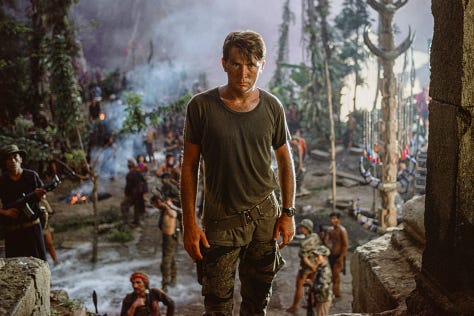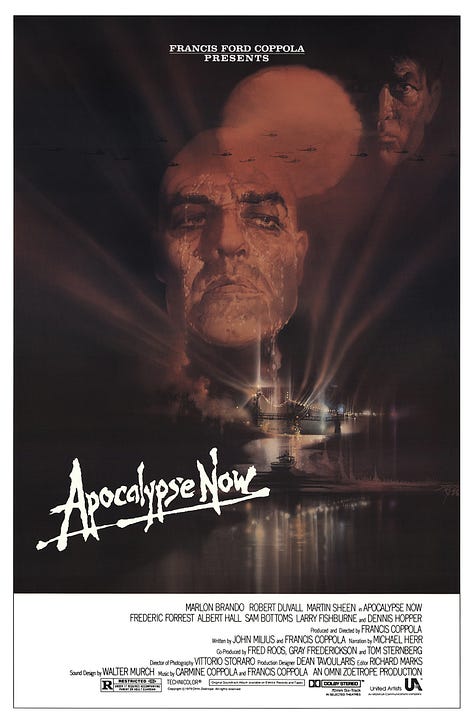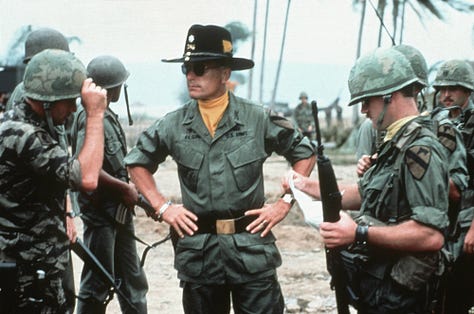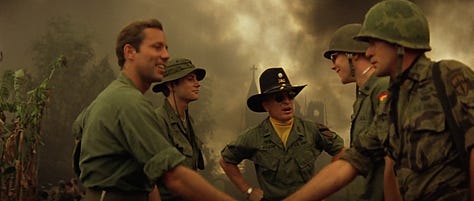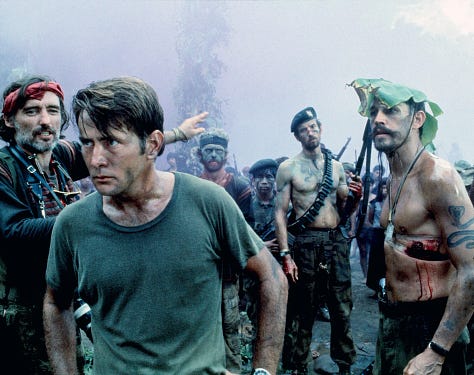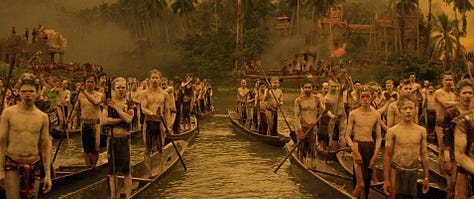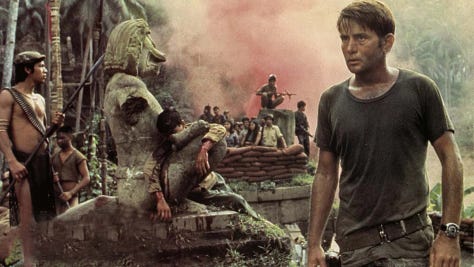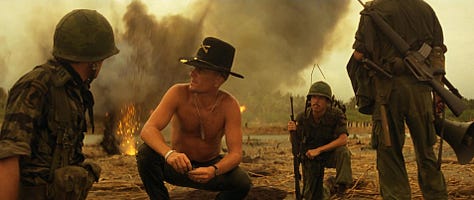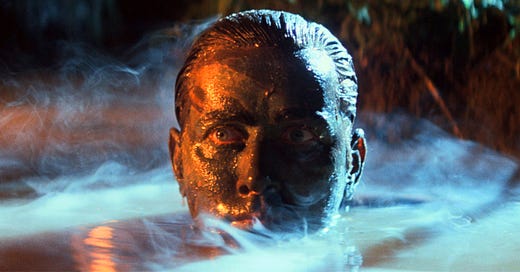APOCALYPSE NOW
1979 • Francis Ford CoppolaCast: Marlon Brando, Robert Duvall, Martin Sheen, Frederic Forrest, Albert Hall, Sam Bottoms, Larry Fishburne, Dennis Hopper, G. D. Spradlin, Harrison Ford, Michael Herr
Writers: John Milius, Francis Ford Coppola
Cinematography: Vittorio Storaro
Music: Carmine Coppola, Francis Ford Coppola
Producer: Francis Ford Coppola
United Artists
I love the smell of napalm in the morning.
Inspired by Joseph Conrad's novella Heart of Darkness, Apocalypse Now follows Captain Benjamin Willard (Martin Sheen), a disillusioned U.S. Army captain, who is assigned a top-secret mission in the harrowing midst of the Vietnam war. Willard is tasked with assassinating Colonel Walter E. Kurtz (Marlon Brando), a highly decorated and enigmatic officer who has gone rogue and established his own kingdom deep within the Cambodian jungle. As Willard journeys up the Nung River towards the heart of darkness, he encounters a surreal and nightmarish landscape, filled with the horrors of war and madness. While it’s rightfully considered a masterpiece now, the film was famously troubled with multiple setbacks including shooting delays, rewrites, unprepared actors, health problems, weather delays, re-edits, and massive egos, to name just a few.
Apocalypse Now explores the psychological toll of warfare on Captain Benjamin Willard, as he wrestles with the morality of his mission and confronts the blurred lines between good and evil. The film opens with Willard in a Saigon hotel room, clearly tormented by the psychological scars of war. He is surrounded by desolation. He smokes and drinks heavily. He’s already suffering from severe post-traumatic distress, and he hasn’t even gone on his assassination mission yet. And he has more trauma ahead of him. One of the most intense scenes occurs when Willard and his crew come across a Vietnamese village that has been decimated by American forces. The brutality and senselessness of the massacre is shocking, yet Willard is steadfast. Much like the United States’ involvement in the war itself. For Willard, right and wrong, good and evil… it’s all irrelevant. The mission is all that matters.
It’s not just moral righteousness that is challenged. The absurdity and pointlessness of war is also highlighted, specifically in the character Lieutenant Colonel Kilgore (Robert Duvall). Kilgore's surfing obsession emphasizes the detachment from reality that often characterizes the Vietnam War. Kilgore's fixation on surfing stands out as particularly absurd in the context of the war. Amidst the violence, chaos, and human suffering, Kilgore finds solace and pleasure in pursuing and discussing his personal passion for surfing. Kilgore’s actions are over the top, as seen in one of the most memorable sequences in the film: a helicopter napalm airstrike led by Kilgore to secure a beachhead while blasting “Ride of the Valkyries” on loudspeakers. In the midst of a raging battle, Kilgore insists that the waves are perfect for surfing: “If I say it’s safe to surf this beach, Captain, then it’s safe to surf this beach! I mean, I'm not afraid to surf this place, I'll surf this whole fucking place!”
Captain Willard's journey into the heart of darkness, is both geographical and psychological. His descent into the deep jungles mirrors the unraveling of his sanity. The war-torn landscapes, the brutal atrocities, the encounters with characters like Kilgore, and the ramblings of Dennis Hopper’s photojournalist all contribute to the erosion of Willard's grip on reality. By the time he reaches Kurtz's compound, the line between sanity and madness becomes increasingly blurred, for both Willard and the audience. Kurtz's compound in the Cambodian jungle becomes the ultimate manifestation of the psychological toll of war. Kurtz, once a revered officer, has fully embraced madness and has become a symbol of the darkness within humanity. His extreme philosophies force Willard to confront his morality. Within Kurtz, he sees a mirror, a distorted reflection of his own potential fate. The realization that Kurtz's extreme actions could be a manifestation of the extreme choices Willard himself is capable of making underscores the final act of the film. The confrontation with Kurtz becomes not just the culmination of the mission but an internal struggle, with Willard forced to confront the unsettling possibility that, under different circumstances, he could become the man he was sent to terminate.
During the tumultuous and troubled filming of the years-long project that was Apocalypse Now, Eleanor Coppola, the wife of Francis Ford Coppola, directed unquestionably the greatest “making of” documentary of all time. Hearts of Darkness: A Filmmaker's Apocalypse is a compelling and revealing documentary that provides an intimate look behind the scenes of Apocalypse Now. The documentary offers an unfiltered exploration of the challenges, chaos, and sheer madness that plagued the production of the film. Through a combination of behind-the-scenes footage, interviews, photos and audio recordings, the documentary exposes the struggles faced by Francis, including financial woes, the unpredictable weather in the Philippine jungle, and the disruptive behavior of Marlon Brando. Hearts of Darkness becomes a parallel narrative to the film itself, delving into the heart of the creative process and the toll it takes on those involved. The documentary not only serves as a companion piece to Apocalypse Now but also stands on its own as an exploration of the trials and tribulations inherent in the pursuit of cinematic integrity.
The horror... the horror...
Notable Awards & Accomplishments
8 Academy Award Nominations including Best Picture, Best Director, and Best Supporting Actor (Duvall)
2 Academy Award Wins: Best Cinematography and Best Sound
Ranked #14 Sight & Sound's greatest films poll
Streaming: Not currently streaming
Digital Rental/Purchase: Available at major digital retailers
Physical Media: Available on 4K, Blu-Ray and DVD

